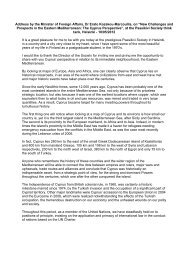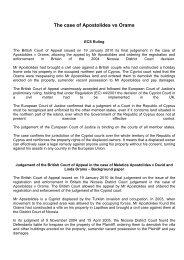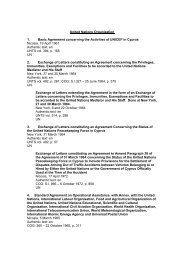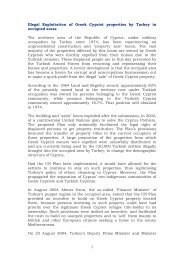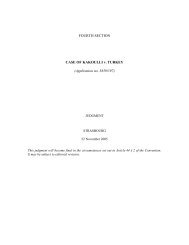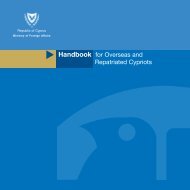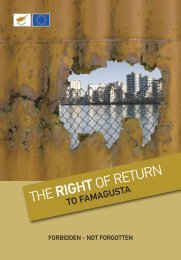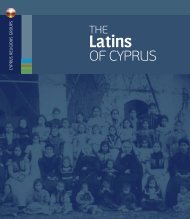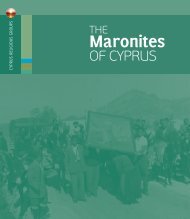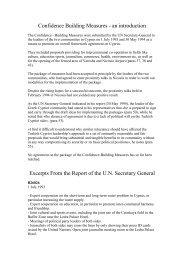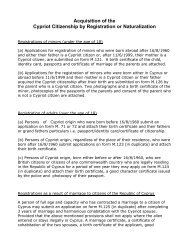Myra Xenides- Arestis v. Turkey
Myra Xenides- Arestis v. Turkey
Myra Xenides- Arestis v. Turkey
Create successful ePaper yourself
Turn your PDF publications into a flip-book with our unique Google optimized e-Paper software.
XENIDES-ARESTIS v. TURKEY DECISION 35Article 159 of the “TRNC Constitution” is legally invalid and that,therefore, Greek-Cypriot owners of immovable property in northern Cyprus,just as the applicant, have retained their title and should be allowed toresume free use of their possessions. They observe that these importantelements were reaffirmed in the cases of Cyprus v. <strong>Turkey</strong> (op. cit.),Demades v. <strong>Turkey</strong> (op. cit.) and Eugenia Michaelidou and MichaelTymvios v. <strong>Turkey</strong> (op. cit.) and continue to apply despite any purported“change” in the legal situation because of the content of the “Law”.They submit that it is clear from the Court's jurisprudence that it wouldnot have allowed expropriation by the “TRNC” under Article 159 of the“TRNC Constitution”, even if compensation had been available at the time.The fact that compensation may now be available under the new Law doesnot alter the validity and continuing relevance of the reasons why the Courtwas not willing to allow or recognise as expropriation the acts of the“TRNC”. The Law is, according to the Cypriot Government, a means ofexpropriating the property of the applicant in the occupied area for thebenefit of <strong>Turkey</strong>'s subordinate administration, the “TRNC”, contrary to therelevant principles of the Convention and international law.In their view, the Law is also incompatible with the international lawprinciple which prohibits the forcible displacement of populations asamounting to a crime against humanity and ethnic cleansing since followingthe illegal invasion of 1974, Greek Cypriots were displaced by <strong>Turkey</strong> fromthe Turkish-occupied area of Cyprus. The Cypriot Government assert thatthe Law is intended to implement and consolidate these breaches whilst itslegal recognition would, in effect, amount to allowing <strong>Turkey</strong>, thewrongdoing State, by the promise of payment of compensation or thepayment of compensation, to purchase the benefits of derogating from theinternational legal obligation to provide complete restitution. The originalwrong would then be endorsed and entrenched, in its characteristics and itseffects, and there would be a denial of justice to the victims of thatwrongdoing. A vacuum would be created in the system of human rightsprotection given that the applicant and other victims of breaches ofConvention rights would be confined to such remedies, if any, as madeavailable in the “TRNC” with no supervision by the Court.As regards the temporal aspect of the application and the question ofretrospective effect of the Law, the Cypriot Government maintain thatinterpreting Article 35 of the Convention in a way as to allow theretrospective application of the Law to all applications, irrespective of whenthey were submitted, and not “at the relevant time” in accordance with theCourt's case-law, would breach the principle of legal certainty and interfereunjustifiably with the acquired rights and legitimate expectations of theapplicants to have their applications determined by the Court within areasonable time in accordance with Convention standards. They point outthat in fact, the Law itself does not contain any provision which expressly




